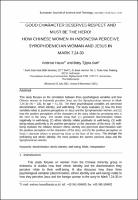| dc.description.abstract | This study focuses on the correlation between three psychological variables and how Chinese women in Indonesia perceive Jesus and the Syrophoenician woman in Mark 7.24-30 (N = 230, M age = 41.70). The three psychological variables are perceived discrimination, ethnic identity, and well-being. The study evaluates (1) how the three variables relate to positive perceptions on Jesus and the Syrophoenician woman, and (2) how the positive perceptions of the characters in the story relates to perceiving who is the hero in the story. The results show that; (1) perceived discrimination relates negatively to well-being, (2) ethnic identity relates positively to well-being, (3) well-being relates positively to the positive perception on the characters of the story, (4) well-being mediates the relation between ethnic identity and perceived discrimination with the positive perception on the characters of the story, and (5) the positive perception on Jesus’s character relates to perceiving Jesus as the hero of the story. The stronger the well-being and ethnic identity, the more positive the women perceive Jesus and the Syrophoenician woman. | en_US |


